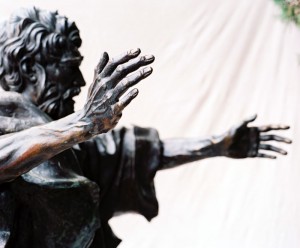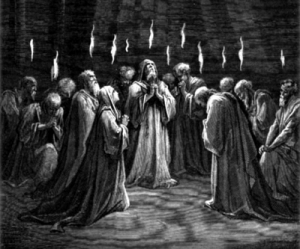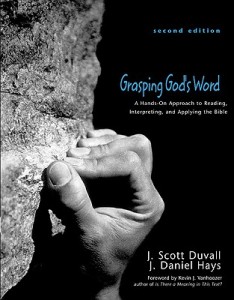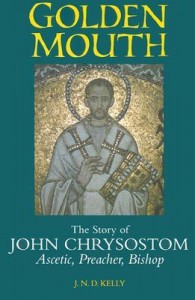14 But Peter, standing with the eleven, lifted up his voice and addressed them: “Men of Judea and all who dwell in Jerusalem, let this be known to you, and give ear to my words. 15 For these people are not drunk, as you suppose, since it is only the third hour of the day. 16 But this is what was uttered through the prophet Joel: 17 “‘And in the last days it shall be, God declares, that I will pour out my Spirit on all flesh, and your sons and your daughters shall prophesy, and your young men shall see visions, and your old men shall dream dreams; 18 even on my male servants and female servants in those days I will pour out my Spirit, and they shall prophesy. 19 And I will show wonders in the heavens above and signs on the earth below, blood, and fire, and vapor of smoke; 20 the sun shall be turned to darkness and the moon to blood, before the day of the Lord comes, the great and magnificent day. 21 And it shall come to pass that everyone who calls upon the name of the Lord shall be saved.’
The Spirit of God falls in holy wind and fire upon the gathered Church, and suddenly the waiting band of believers is transformed into a body of bold, courageous, proclaimers of divine truth. They are set on fire with the Spirit of the living God. As a result, they speak. The crowd responds with amazement, astonishment, confusion, and, in some cases, mockery, accusing the believers of being drunk.
Into this electric environment, onto this amazing stage, as the disciples preach Christ and the growing crowd murmurs amongst itself about what these things might mean, Peter stands up. Peter stands and delivers the first official sermon in the life of the Church. As we prepare our hearts for the Lord’s Supper this morning, we are honored to hear this word. What it reveals about Christ and what He was and is doing through the life of His Church is powerful and worthy of our attention.
The Church age marks the beginning of the last days, a time between the times.
In the midst of this agitated crowd, Peter, blessed Peter, stands and demands the audience’s attention.
14a But Peter, standing with the eleven, lifted up his voice and addressed them
John Chrysostom marveled at Peter’s boldness here and reminded his 4th century congregation that it was not long before this moment that Peter was afraid to speak honestly to a little girl while Jesus was being tried.
He, who could not endure the questioning of a poor girl, now discourses with such great confidence in the middle of people all breathing murder upon him. This in itself became an indisputable proof of the resurrection. He spoke [among] people who could deride and make a joke of such sort things!…For wherever the Holy Spirit is present, people of clay are changed into people of gold.[1]
Ah, how beautiful! “Wherever the Holy Spirit is present, people of clay are changed into people of gold.” Peter looked so very much like clay when he denied Jesus three times. Here, he shines like gold. Hear what he says.
14b “Men of Judea and all who dwell in Jerusalem, let this be known to you, and give ear to my words. 15 For these people are not drunk, as you suppose, since it is only the third hour of the day. 16 But this is what was uttered through the prophet Joel: 17a “‘And in the last days it shall be, God declares, that I will pour out my Spirit on all flesh…
Peter first denies that the early followers are drunk as it is too early in the day for people to be drunk. This is likely an example of humor, and we may imagine that there was some laughter among the gathered crowd.
Interestingly, Peter next moves to quote the Old Testament scriptures. He is speaking to Jews and he quotes a prophetic passage from Joel. In particular, he quotes from Joel 2.
28 “And it shall come to pass afterward, that I will pour out my Spirit on all flesh; your sons and your daughters shall prophesy, your old men shall dream dreams, and your young men shall see visions. 29 Even on the male and female servants in those days I will pour out my Spirit. 30 “And I will show wonders in the heavens and on the earth, blood and fire and columns of smoke. 31 The sun shall be turned to darkness, and the moon to blood, before the great and awesome day of the Lord comes. 32 And it shall come to pass that everyone who calls on the name of the Lord shall be saved. For in Mount Zion and in Jerusalem there shall be those who escape, as the Lord has said, and among the survivors shall be those whom the Lord calls.
Let us note, again, that Peter roots his sermon in scripture, as all good preaching must be. But let us also note the provocative nature of the passage Peter points to. Peter tells the gathered crowd that the astounding and amazing things they have just witnessed – tongues of flame and the miraculous preaching of the gospel in their own languages – mean that they are now in “the last days,” the days that the prophet Joel had spoken of so many years before.
Joel had said that God would pour out His Spirit in the last days. William Larkin descriptively writes that “Joel used the imagery of the vivifying impact of a Near Eastern torrential downpour on parched earth to picture the generosity, finality, and universality of the Spirit’s coming.”[2] The Spirit was going to be poured out like refreshing rain in a dry and thirsty land, and this, Peter tells the crowd, is what had just happened.
In other words, Peter announces that the last days had begun. This point may be lost on us, because sometimes we think of “the last days” as only the moment of or immediate events surrounding Christ’s second coming. But Peter is saying something that would have struck the Jewish audience as astounding, given their understanding of the last days.
The Jews had divided all of time into two categories: the present age and the age to come. The present age was marked by darkness, decay, and death. The age to come would be marked by wholeness, the direct reign of God, and the abolishment of all evil. “Between the two,” Barclay writes, “there was to be the day of the Lord, and it was to be the birth pangs of the new age.”[3]
In other words, Peter is saying that the coming of the Holy Spirit marks the beginning of the end. It is not the end. The end will not come until King Jesus returns. But the end has now begun. We simply await its finalization, its ultimate consummation. This means that the Church which lives in the overlap of the decaying, dark kingdom of the world and the in-breaking, victorious Kingdom of God occupies a place between two times: the time of the present age and the time of the age to come, the time between the time of darkness and the coming time of light.
The Church resides in an age between two ages, a time between two times. It has residency in the world but citizenship in the Kingdom of God. It yet must guard itself against the encroaching last gasps of the decaying kingdom of the world while it points the lost world to the present and coming reality of the eternal Kingdom of God.
Yes, the Church occupies a time between the times, and this is why Peter quotes Joel. The end is coming. It is already begun! Therefore the Church must speak with clarity and conviction and urgency and boldness.
This time between the times is marked by the presence of a radically unified people without class or social distinction who lovingly and boldly call lost men and women to be saved from the judgment to come through the saving name of Christ.
What happens in this time between the times? Peter, in quoting Joel, tells us, and it is an awesome thing to hear.
17 “‘And in the last days it shall be, God declares, that I will pour out my Spirit on all flesh, and your sons and your daughters shall prophesy, and your young men shall see visions, and your old men shall dream dreams; 18 even on my male servants and female servants in those days I will pour out my Spirit, and they shall prophesy. 19 And I will show wonders in the heavens above and signs on the earth below, blood, and fire, and vapor of smoke; 20 the sun shall be turned to darkness and the moon to blood, before the day of the Lord comes, the great and magnificent day.
Amazing! This time between the times is marked by the presence of a radically unified people without class or social distinction who lovingly and boldly call lost men and women to be saved from the judgment to come through the saving name of Christ. This time between the times is a time of Spirit-filled power in which clay becomes gold, nobodies become somebodies, the weak become strong, the timid become bold, the downtrodden become valued and needed, the hiding step out into the open, and those who previously had nothing to say now set the world on fire with their message of a crucified and risen King.
And the Spirit is poured at on all! Everybody! The things of God are no longer the possession of an elite few, the religious professionals, the spiritual “brights.” No, the deep mysteries of God have now been put into the mouths of men and women and boys and girls and even slaves! God now takes up residence in the hearts of all who will come to Him and, in so doing, He levels the playing field, making all of His people fit vessels regardless of the arbitrary categories society hoists on people.
Martin Luther argued that this prophecy from Joel signaled the end of the old priesthood and the beginning of what we might call a populist priesthood.
Therefore the Levitical priesthood will be revoked and a new priesthood will be established, as he indicates by “your sons, daughters, my servants.” This means “every kind of flesh” or person. I will accept women, young girls, and I will teach them all how they should prophesy. Slaves will enter [the prophetic] office…Here Joel says every kind of person can be bishop, priest, pope and cardinal. This is a powerful text that throws down the priesthood…This is an irritating word that over Caiaphas the powerful, excellent man a tax collector should come first. A Carthusian who has been in the order for forty years should be no better than a maid who carries grass to the cows.[4]
Who are the proclaimers of this amazing news of the King and His Kingdom? You are? YOU are!
Do you think you are unworthy to speak of Christ and His Kingdom? You are not, for the Spirit of the living God resides within you if you are in Christ. Do you think you are too insignificant to be a herald of the great King? You are not! Do you think that you have nothing to contribute? You do! You DO! You have Christ, the Lord of Heaven and Earth, and His Spirit dwells within you.
And what is the result of this courageous witness bearing?
21 And it shall come to pass that everyone who calls upon the name of the Lord shall be saved.’
As if we have not been honored enough through the gift of the Spirit and the stewardship of proclamation and the privilege of witness, now we are asked to accept the fact that through our faithful witness bearing, others can be saved! Everyone who calls upon the name of the Lord shall be saved…and they shall call upon His name as His people speak it and as His Spirit brings conviction.
The Church that dwells in the time between the times has the privilege and responsibility of telling those still stuck in the decaying world order that they can be saved, that they can pass from darkness to light, that they can come home! Perhaps you are that person. Perhaps you are the one who needs to come home. If so, come now. You have the promise of God. “Everyone who calls upon the name of the Lord shall be saved.”
Of what does that call consist? It consists of repentance and faith. He has made a way for you through His cross and through His empty tomb. Death has been defeated. The gates of Hell have been overcome. The devil has been put on notice.
This kingdom of darkness, this lost and decadent and rebellious kingdom of the world is slipping away. If you are honest, you will admit that you know it is so. You can feel it. But as the darkness slips away, the light calls to us. Christ, the light that shines in the darkness, calls to us.
Come to Jesus.
Come to the King.
Come today.
[1] Francis Martin, ed. Acts. Ancient Christian Commentary on Scripture. New Testament, vol.V. Thomas C. Oden, gen. ed. (Downers Grove, IL: InterVarsity Press, 2006), p.28.
[2] William J. Larkin, Jr. Acts. The IVP New Testament Commentary Series. Vol.5. Grant R. Osborne, ser.ed. (Downers Grove, IL: InterVarsity Press, 1995), p.53-54.
[3] William Barclay, Acts. The Daily Study Bible. (Edinburgh: The Saint Andrew Press, 1969), p.20.
[4] Esther Chung-Kim and Todd R. Hains, eds. Acts. Reformation Commentary on Scripture. New Testament, vol.VI. Timothy George, gen. ed. (Downers Grove, IL: InterVarsity Press, 2014), p.26.







